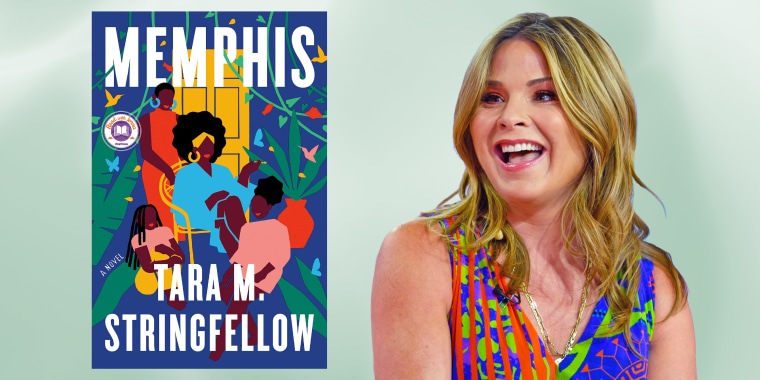For April, Jenna Bush Hager picked "Memphis" by Tara M. Stringfellow as her Read With Jenna book club pick.
Stringfellow's debut novel is a story about loss. love, family, race and legacy. It is told over 70 years from the shifting perspectives of three generations of strong Black women. The book jumps back and forth through time as it slowly unveils the legacy each generation passes down to the next.
After reading, use the questions provided by the publisher to spark a conversation amongst friends and family.
- Joan’s sections are told in first person, while the other North women are written in third person. How did this change in perspective affect your reading experience? Did it make you identify more strongly with any of the characters?
Discuss the different generations of North women — and North men — and some of the defining characteristics of each person. Which traits were passed down through the family line? Which traits seem to belong to individuals?
Why do you think Miriam brought Joan and Mya to live with August and Derek, despite knowing what happened to Joan years before? Do you think she made the right choice? Why or why not?
“Wars fascinated me,” Joan says. “How on earth could a sane man charge into a volley of bullets—say, at D-Day? Weren’t they terrified?” She later compares these feelings to her own experience walking into August’s house knowing Derek lived there, too. What do you make of this comparison? Do you believe personal traumas can be as damaging as war?
How do Myron and Hazel’s lives — and deaths — reverberate through the future generations of their family?
Memphis is full of cultural references, from historical events and figures to well-known music and literature. How did these details influence your reading experience? Which reference was your favorite?
“History had awakened me to the fact that racism is the only food Americans crave,” Stringfellow writes. Discuss this quote. What do you think she means by this? Do you agree? Why or why not?
How do the people of Douglass support each other throughout the years? What do you think Memphis is saying about the value of community? Does this community support ever fall short? If so, where?
“I wasn’t sure if my burying that comb was what landed my cousin in prison,” Joan says, “but I thanked God — and Miss Dawn — for the magic of it.” Do you believe the magic worked? Either way, do you feel Joan got justice for what happened to her when Derek went to prison? Why or why not?
Joan’s relationship with her father remains complicated throughout the novel. “I did not forgive him for abandoning us,” she says. “That is too big a thing to forgive. But driving in the Shelby through the streets of North Memphis with Daddy, I couldn’t deny how lovely it felt to have one.” Do you think it’s possible for a relationship to move forward without forgiveness? Why or why not?
One of the themes of the novel is encapsulated in this quotation: “The things women do for the sake of their daughters. The things women don’t.” How do these lines describe the behaviors of the North women?
August once says to Joan, “Free? A Black woman hasn’t ever known the meaning of that word, my love.” By the end of the novel, Joan says, contrary to what August told her, that she does feel free. What gives her this freedom? What kind of life do you imagine for Joan and Mya’s own daughters, if they choose to have them?
For more book recommendations, check out:
- Jenna Bush Hager picks 'engaging' multigenerational family saga for April 2022
- From romance to a family epic, Lee Cole shares 5 books to read after 'Groundskeeping'
- All of Jenna Bush Hager's book club picks
Subscribe to our Stuff We Love and One Great Find newsletters, and download our TODAY app to discover deals, shopping tips, budget-friendly product recommendations and more!


